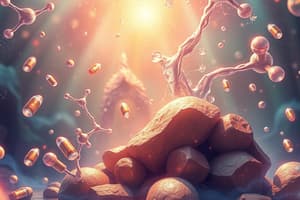Podcast
Questions and Answers
Define essential amino acid, non-essential amino acid, and conditionally essential amino acid. Under what conditions might a non-essential amino acid become conditionally essential?
Define essential amino acid, non-essential amino acid, and conditionally essential amino acid. Under what conditions might a non-essential amino acid become conditionally essential?
Essential amino acids must be supplied by foods; non-essential amino acids are made by the body; conditionally essential amino acids become essential under extreme trauma or stress.
If excess protein is consumed, the body will just excrete the intact amino acids in the urine.
If excess protein is consumed, the body will just excrete the intact amino acids in the urine.
False (B)
What is the RDA for protein (g/day) of a 30-year-old healthy woman (not pregnant, not an athlete) with an ideal body weight of 70kg?
What is the RDA for protein (g/day) of a 30-year-old healthy woman (not pregnant, not an athlete) with an ideal body weight of 70kg?
56.0
During childhood, a person is typically in a state of _______________ nitrogen balance.
During childhood, a person is typically in a state of _______________ nitrogen balance.
What are two metabolic processes where amino acids can form energy when protein intake is excessive, or energy intake is low?
What are two metabolic processes where amino acids can form energy when protein intake is excessive, or energy intake is low?
What delivers the instructions from the genes to where proteins are made on the ribosomes?
What delivers the instructions from the genes to where proteins are made on the ribosomes?
List two functions of protein in the body and describe how each function occurs.
List two functions of protein in the body and describe how each function occurs.
Flashcards are hidden until you start studying
Study Notes
Amino Acids
- Essential Amino Acids: Must be obtained from dietary sources as the body cannot synthesize them.
- Non-Essential Amino Acids: Can be produced by the body through transamination and are not required in the diet.
- Conditionally Essential Amino Acids: Typically non-essential but become essential during extreme physiological conditions, such as trauma, surgery, or severe stress.
Protein Excretion
- It is incorrect to say that excess protein is solely excreted in urine as intact amino acids.
Recommended Dietary Allowance (RDA) for Protein
- For a healthy 30-year-old woman with an ideal body weight of 70kg, the RDA for protein is 56.0 grams per day, based on the guideline of 0.8g protein per kilogram of body weight.
Nitrogen Balance
- During childhood, the body is usually in a positive nitrogen balance, indicating that nitrogen intake exceeds nitrogen losses, necessary for growth and development.
Energy Production from Amino Acids
- Excessive protein intake or inadequate caloric intake can lead to amino acids being converted to energy through:
- Gluconeogenesis: The conversion of non-carbohydrate substrates into glucose.
- Ketogenesis: The process of producing ketones from fatty acids, primarily in the liver.
Protein Synthesis
- mRNA (messenger RNA) serves as the carrier of genetic information from DNA to ribosomes, where proteins are synthesized.
Functions of Protein
- Proteins provide energy, yielding 4 kcal per gram consumed, depending on dietary intake.
- Proteins play a crucial role in regulating and maintaining bodily functions through the 20 amino acids they utilize, of which 9 are essential.
Studying That Suits You
Use AI to generate personalized quizzes and flashcards to suit your learning preferences.




